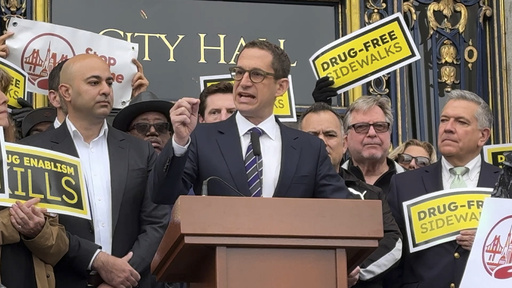SAN FRANCISCO — The Board of Supervisors in San Francisco is preparing to empower new Mayor Daniel Lurie with enhanced authorities aimed at addressing the ongoing fentanyl crisis that has transformed city streets into hotspots for drug use and homelessness.
The legislation, up for a vote on Tuesday, proposes to remove competitive bidding requirements for certain contracts and enables the city to seek private donations to rapidly increase shelter capacity by adding 1,500 beds, as well as to expand the number of public safety and mental health personnel. This legislative initiative marks Lurie’s first action as mayor; he is recognized as a member of the Levi Strauss family and has established a nonprofit organization focused on combating poverty. His election came after he successfully challenged the reelection of Mayor London Breed last year.
The proposal is expected to secure the six votes necessary for approval, with further support anticipated in the upcoming vote. The decision of the 11-member board to forgo its oversight powers demonstrates the urgency felt by supervisors who are desperate for viable solutions. This action represents a temporary endorsement of Lurie, a political newcomer who has committed to working collaboratively to devise practical resolutions.
Supervisor Connie Chan noted last week during a budget and finance committee session that while board oversight is critical for ensuring responsible and transparent expenditure of taxpayer funds, the current crisis presents “truly an unprecedented time” that may warrant unconventional approaches. She acknowledged the mayor’s readiness to reach compromises, contrasting Lurie’s more cooperative style with Breed’s previously strained relations with the board’s progressive members.
San Francisco, traditionally known for its progressive politics, has witnessed a notable increase in homeless encampments and public substance abuse since the COVID-19 pandemic began. In 2023, the city recorded over 800 overdose fatalities linked to inexpensive and highly potent fentanyl. Frustrated by the situation, residents have advocated for expanded police powers and supported tougher measures against street homelessness. Additionally, they have favored the election of more centrist Democrats to the Board of Supervisors.
Lurie’s proposal would empower the city to bypass standard competitive bidding processes for contracts, grants, and leases associated with issues of addiction, homelessness, and personnel recruitment in public safety. This plan would allow city departments to enter new leases without needing board approval. A key element of Lurie’s vision includes the establishment of a 24-hour drop-off center designed to be more police-friendly and serve as an alternative to incarceration.
Supervisors would be required to vote within 45 days on contracts valued at up to $25 million — a reduction from the original $50 million limit suggested by the mayor — or forfeit their authority. The proposal for expedited contracting is set to expire in one year, shortened from an initial term of five years.
The San Francisco AIDS Foundation has expressed opposition to the bill, citing concerns over its lack of concrete metrics and details regarding its effectiveness in reducing fentanyl use. Laura Thomas, the organization’s drug policy expert, commended the mayor’s intention to enhance housing and treatment options, while also cautioning against policies that compel individuals into treatment due to their proven ineffectiveness and potential harm.
“We seek further clarification on the proposal,” Thomas stated on Monday. “We have reservations and require more information before we can lend our support.”
At a meeting of the budget and finance committee on Wednesday, legislative analyst Nicolas Menard cautioned that waiving competitive bidding could lead to inflated service costs and open the door to potential waste and fraud. While the full financial implications remain uncertain, the budget for grants and contracts in the impacted city departments exceeds $1 billion.
“I want to stress that this represents a significant loss of oversight,” he remarked.
Nevertheless, the proposal garnered unanimous support in committee, and Lurie later issued a statement declaring that this ordinance signifies a committed response to the fentanyl epidemic. “We are no longer turning a blind eye — we are treating the fentanyl crisis as the emergency it truly is,” he affirmed. “This marks a new chapter for City Hall.”
